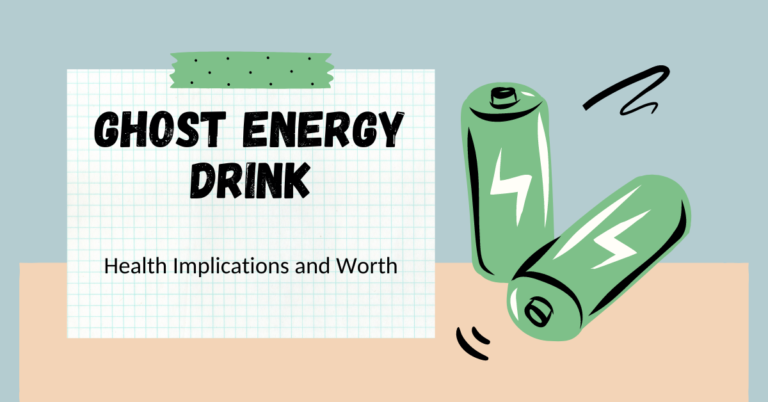In the bustling world of energy drinks, Ghost Energy drink has carved a niche for itself, promising a “Feel Good Energy” experience without the usual sugar rush or artificial colors. This article delves into the ingredients, potential risks, and the overall health implications of consuming Ghost Energy drink. We’ll explore the scientific facts behind its components, dissecting its claims of being a healthier alternative, and weigh the benefits against the possible downsides.
The Ingredients of Ghost Energy Drink
Ghost Energy drinks tout a blend of ingredients that sets them apart from traditional energy beverages. Let’s break down each component:
- Carbonated Water: Provides the refreshing fizz that characterizes energy drinks.
- Citric Acid: Used for flavoring and as a preservative.
- Acetyl-L-Carnitine HCl: A compound linked to energy metabolism and brain function.
- Taurine: An amino acid with potential benefits for cardiovascular health.
- Natural Caffeine: Derived from coffee beans, a primary stimulant.
- Sucralose: An artificial sweetener providing sweetness without the calories.
- Alpha-GPC: Claimed to enhance cognitive function.
- Sodium Benzoate and Potassium Sorbate: Preservatives ensuring shelf stability.
- Ascorbic Acid: Vitamin C, offering antioxidant properties.
- Acesulfame Potassium: Another artificial sweetener.
- Neurofactor Coffee Fruit Extract: Sourced from Coffea arabica, possibly contributing to mental alertness.
- Astragin Root Extracts: Nootropics that may improve cognitive performance.
- B-Vitamins: Including D-Calcium Pantothenate, Biotin, Niacinamide, Pyridoxine HCl, Thiamine HCl, Folic Acid, and Cyanocobalamin, supporting various metabolic functions.
The standout feature of Ghost Energy is its sugar-free composition, a departure from the high-sugar content of many conventional energy drinks. This aspect contributes significantly to its image as a healthier option in the market.
Caffeine Content and Safety
One of the critical aspects of any energy drink is its caffeine content, and Ghost Energy doesn’t hold back in this regard, providing a substantial 200mg per can. This amount falls within the generally accepted daily caffeine intake limit for most healthy adults, which is around 400mg. However, it’s crucial to note that individual tolerance levels can vary significantly.
Excessive caffeine consumption can lead to adverse effects such as:
- Insomnia: Disrupting sleep patterns and overall restfulness.
- Increased Heart Rate and Blood Pressure: Especially concerning for individuals with cardiovascular issues.
- Digestive Distress: Including acid reflux, stomach irritation, and nausea.
- Anxiety and Jitters: Exacerbating preexisting anxiety disorders or causing temporary discomfort.
Consumers must be mindful of their total caffeine intake, considering other sources like coffee or tea consumed throughout the day. Combining multiple caffeinated beverages can push individuals beyond their tolerance thresholds, leading to unpleasant symptoms and potential health risks.
The Appeal of Ghost Energy
What sets Ghost Energy apart from its counterparts is its marketing as a guilt-free energy option. The absence of sugar and artificial colors aligns with current health trends that emphasize natural ingredients and reduced sugar intake. This positioning appeals to health-conscious consumers seeking an energy boost without compromising their dietary goals.
Moreover, Ghost Energy incorporates additional compounds like nootropics and B-vitamins, purportedly enhancing cognitive function and supporting overall well-being. While these additives may sound promising, their actual efficacy remains a subject of debate within the scientific community.
Evaluating the Health Impact
While Ghost Energy presents itself as a healthier alternative, it’s essential to consider the broader context of energy drink consumption within a balanced lifestyle. Here are key points to ponder:
- Moderation is Key: Like most stimulant-based beverages, moderation is crucial. Consuming Ghost Energy occasionally and in appropriate amounts is unlikely to pose significant health risks for most individuals.
- Consider Individual Sensitivity: Personal tolerance to caffeine varies widely. Some people may experience adverse effects even within the recommended daily limits.
- Mindful Consumption: Be mindful of total caffeine intake from all sources, including Ghost Energy and other caffeinated beverages or foods.
- Impact on Sleep: Energy drinks, especially those high in caffeine, can disrupt sleep patterns if consumed too close to bedtime. Quality sleep is vital for overall health and well-being.
- Other Health Considerations: Individuals with underlying health conditions, such as heart problems, anxiety disorders, or sensitivity to stimulants, should exercise caution or consult a healthcare professional before consuming energy drinks like Ghost Energy.
The Verdict: Is Ghost Energy Worth It?
In the realm of energy drinks, Ghost Energy stands out for its transparent ingredient listing, absence of sugar, and inclusion of purportedly beneficial additives like nootropics and B-vitamins. For individuals seeking an occasional energy boost without the guilt of excess sugar or artificial additives, Ghost Energy can be a reasonable choice.
However, it’s crucial to approach consumption with awareness and moderation. Energy drinks, including Ghost Energy, are not a substitute for a balanced diet, regular exercise, and healthy lifestyle practices. They should be viewed as occasional supplements rather than dietary staples.
Ultimately, whether Ghost Energy is “bad for you” depends on how it fits into your overall dietary habits and health goals. Like any dietary choice, informed decision-making and moderation are key to enjoying the benefits without risking adverse effects.

